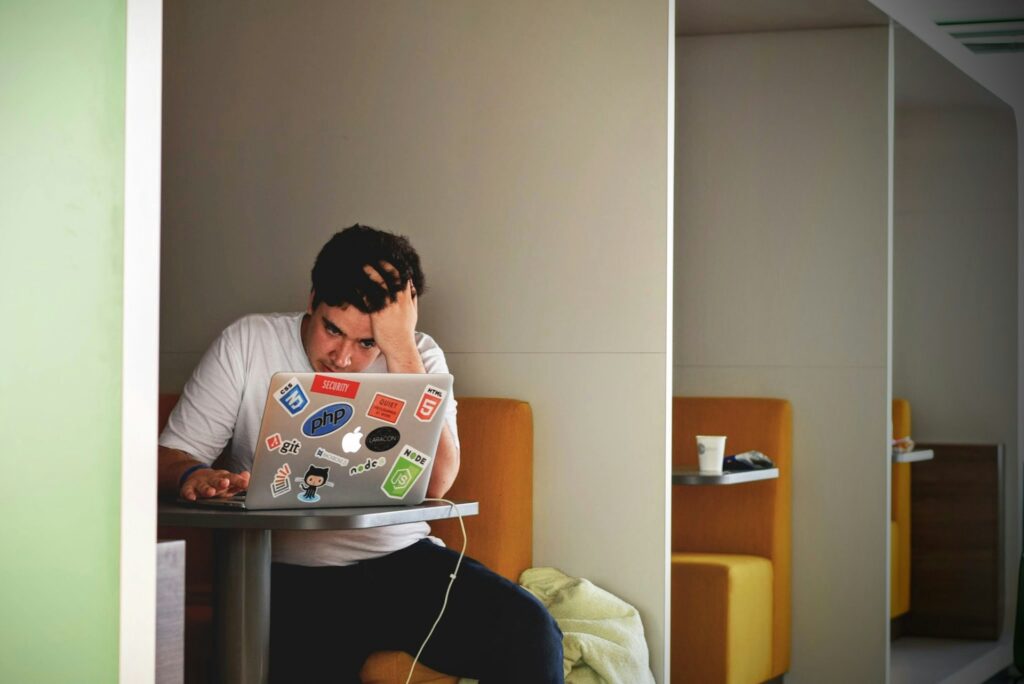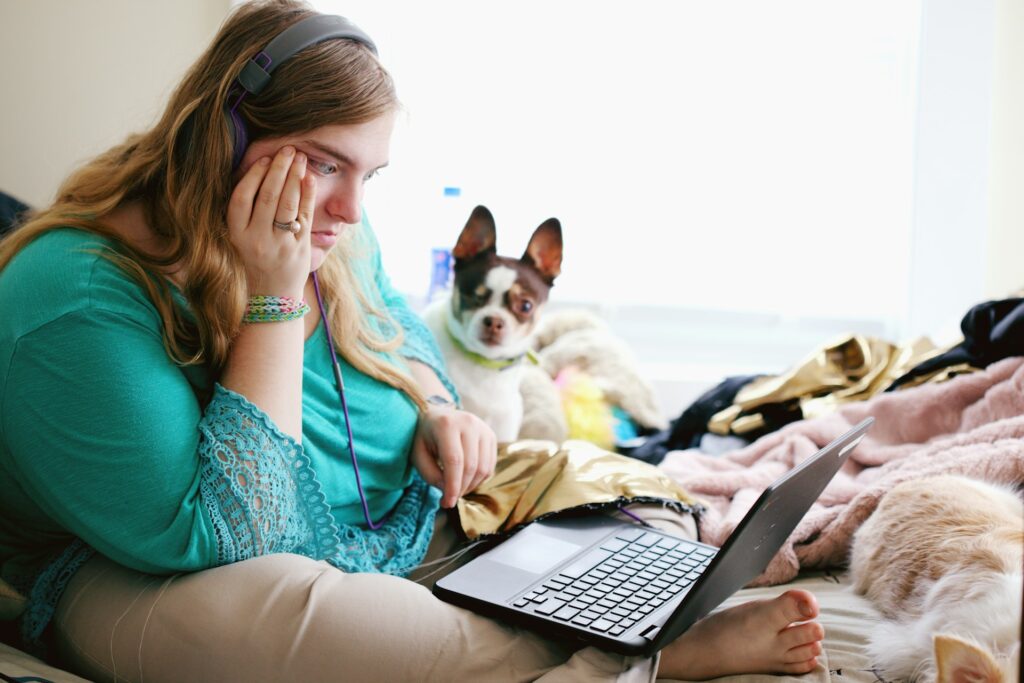We have more access, more convenience, and more connection than ever—and somehow, we’re more anxious, more burnt out, and more emotionally distant too.

Modern life offers comfort, but often steals peace. You end up feeling like there has to be more to life, but you have no idea what that is or how to find it, and that’s frustrating and demoralising. Here are some subtle ways it’s slowly but surely draining us, and how to start taking that power back.
1. Constant digital noise makes real stillness feel awkward.

There’s barely a moment where we’re not plugged in. Waiting in line? Scroll. Sitting on the sofa? Background TV. The sheer noise of modern life means stillness starts to feel like something’s wrong—even though it’s what we’re deeply craving. To fight it, make space for deliberate silence. No phone, no podcast, no agenda. Just five quiet minutes a day. Stillness doesn’t have to be earned. It’s where your nervous system starts to recalibrate.
2. Everything is always available, and somehow nothing feels enough.

We live in an age of instant gratification: next-day delivery, endless content, constant stimulation. However, when everything’s within reach, satisfaction becomes slippery. We’re always reaching for more, even when we’re not sure why. Start practising intentional limitation. Choose what you don’t consume this week. Set boundaries not to punish yourself, but to make space for things to actually feel satisfying again.
3. Social media warps our sense of connection.

It promises closeness—likes, replies, tags—but often delivers comparison and disconnection. We scroll past people’s highlight reels and start feeling like we’re falling behind, even when we’re doing okay. Why not curate your digital spaces with care? Mute generously. Unfollow without guilt, and prioritise the people you can actually laugh with in person or call at 2 a.m.—not just the ones who comment on your stories.
4. Productivity is treated like a personality.

You’re not just expected to be productive—you’re expected to identify as productive. Hustle is glorified. Stillness is suspect. Rest is something you “earn” rather than something you inherently need. Enough is enough! Stop measuring your days by output alone. Ask: “Did I breathe? Did I laugh? Did I feel something real?” Those count too. Your worth isn’t your to-do list.
5. We’re expected to be reachable at all times.

Emails, texts, group chats, work messages—there’s no real off-switch. Even rest is interrupted by the pressure to reply, respond, or stay in the loop. It’s a slow erosion of boundaries. It’s time to normalise delayed replies and clear boundaries. Turn off read receipts. Put your phone on do-not-disturb without apologising. Your time and presence are not open-source software.
6. Comparison has become a daily habit.

We compare our homes, our faces, our careers, our entire lives—often to people we’ve never met. And even when we know it’s curated, it still hits a sore spot. We measure our behind-the-scenes against someone else’s highlight reel. We need to stop doing that. Come back to your values, not your metrics. What do you want your life to feel like? Write it down. Re-read it when you catch yourself sizing up someone else’s version.
7. We’ve normalised burnout.

Running on fumes is worn like a badge. Being exhausted is expected. People swap stories about how little sleep they got like it’s a competition. Burnout isn’t the exception anymore—it’s the atmosphere. To free yourself, reject the idea that exhaustion is noble. Prioritise breaks that actually restore you. Say no more often. And remember—resting isn’t quitting. It’s recalibrating.
8. We don’t get bored enough to be creative anymore.

Every moment of boredom is filled with a scroll, a screen, or a background video. We rarely sit long enough in stillness to let our minds wander. But that quiet drift? That’s where creativity used to live. Let yourself be bored on purpose from time to time, as unappealing as that sounds. Go for a walk without headphones. Do the dishes without distraction. Let your mind fidget a little—it’s how it finds new ideas.
9. Emotional self-awareness is treated like a luxury.

In fast-paced life, there’s little space to pause and actually ask how you feel. You’re expected to move on, show up, and keep performing. Feeling things deeply often feels like an inconvenience. Check in with yourself the way you would a close friend. “What’s going on in here?” Let the answers be messy or incomplete. They still matter.
10. We’re always “building a brand” even when we’re not trying to.

Online life makes us curators of our identity—whether we want to be or not. Every photo, every caption, every story subtly shapes how we’re perceived. It’s not just expression anymore. It’s strategy. However, it’s time to do something for no one but you. Something that doesn’t get posted, monetised, or tracked. You’re allowed to have joy that doesn’t perform.
11. There’s too much choice and not enough clarity.

Modern life gives us endless options—what to wear, where to eat, who to follow, how to work. But all that choice can lead to fatigue, second-guessing, and quiet anxiety. Freedom becomes paralysis. To fight it, simplify where you can. Build little defaults. Eat the same lunch three days in a row. Wear your favourites on repeat. Routine isn’t boring—it’s a kindness to your mind.
12. We’ve confused being informed with being overwhelmed.

We’re flooded with updates—news alerts, trending stories, world events we have no power to change in the moment. Staying aware is good, but drowning in input isn’t the same as being engaged. Start to take intentional news breaks. Choose one or two reliable sources. And remind yourself: it’s okay to be informed and grounded. You don’t owe the world your constant anxiety to prove you care.
13. Intimacy is being replaced with “vibe.”

Modern dating and friendship culture often favours aesthetics over depth. Connections are curated through captions, filtered pictures, and short exchanges. It’s easy to feel known and unseen at the same time. Seek out conversations that make you feel real. Go deeper than “how’s your week been?” Be the one who goes first—you’d be surprised how many people are waiting for that cue.
14. We’re constantly sold the idea that we need fixing.

From self-help content to wellness trends, there’s a steady hum of messaging telling us we’re not quite enough—just one more product, habit, or transformation away from happiness. Instead, anchor into what’s already working. Make a list of what you’ve survived, what you’re proud of, what you love about how you show up. Growth is great, but it’s not a prerequisite for being worthy.
15. Time has become a resource, not an experience.

We schedule everything—work, fitness, phone calls—down to the minute. Even leisure gets optimised, and somewhere along the way, time stopped being something we inhabit and started feeling like something we’re always behind on. Create pockets of unstructured time. Let an afternoon unfold without a plan. Time isn’t just something to spend—it’s where your life actually happens.
16. We’re expected to be fine, always.

There’s an unspoken rule to hold it together, stay positive, keep things light. Admitting you’re not okay feels like breaking the social script. So we smile when we’re tired, nod when we’re overwhelmed, and apologise for being human. Stop apologising for having a hard day. Name what’s real. Let others in. Being honest about your limits isn’t weakness—it’s a quiet kind of rebellion in a world that tells you to hide them.


